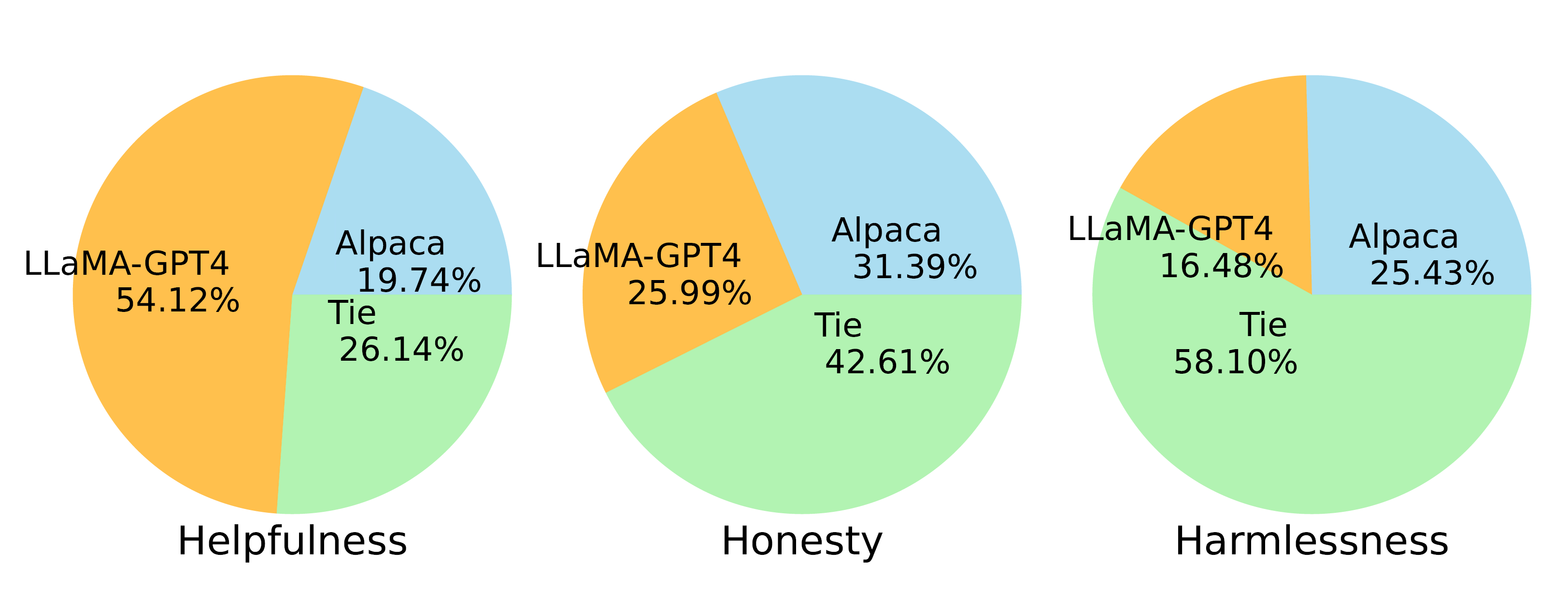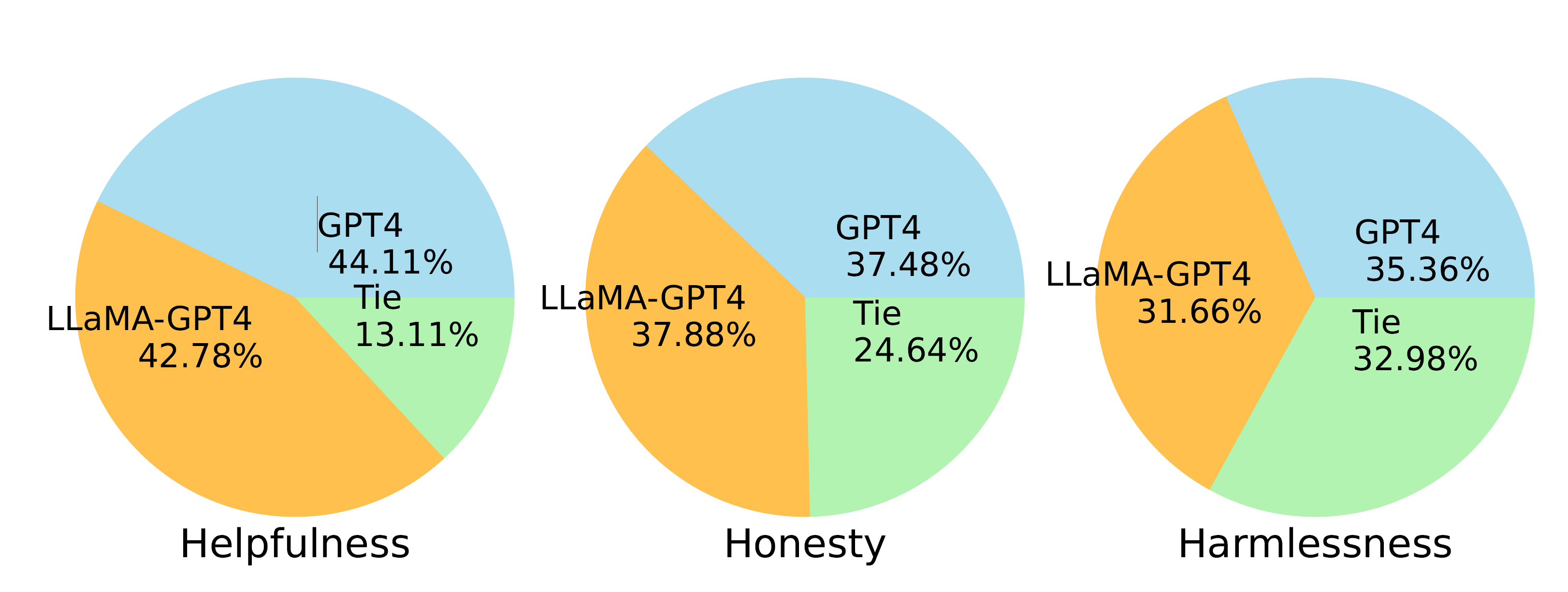Baolin Peng*, Chunyuan Li*, Pengcheng He*, Michel Galley, Jianfeng Gao (*Equal Contribution)
[Project Page] [Paper]

Pronounced as "GPT-4-LLM" or "GPT-for-LLM", image is generated by [GLIGEN](https://gligen.github.io/)
This is the repo for the GPT-4-LLM, which aims to share data generated by GPT-4 for building an instruction-following LLMs with supervised learning and reinforcement learning. The repo contains:
- English Instruction-Following Data generated by GPT-4 using Alpaca prompts for fine-tuning LLMs.
- Chinese Instruction-Following Data generated by GPT-4 using Chinese prompts translated from Alpaca by ChatGPT.
- Comparison Data ranked by GPT-4 to train reward models.
- Answers on Unnatural Instructions Data from GPT-4 to quantify the gap between GPT-4 and instruction-tuned models at scale.
Usage and License Notices: The data is intended and licensed for research use only. The dataset is CC BY NC 4.0 (allowing only non-commercial use) and models trained using the dataset should not be used outside of research purposes.
- [2023.04.06] Paper and data are released.
Large Language Models (LLMs) have shown impressive generalization capabilities such as in-context-learning and chain-of-thoughts reasoning. To enable LLMs to follow natural language instructions and complete real-world tasks, researchers have been exploring methods of instruction-tuning of LLMs. To advance the state of the art of instruction-tuning for LLMs, we present the first attempt to use GPT-4 to generate instruction-following data for LLM finetuning.
-
alpaca_gpt4_data.jsoncontains 52K instruction-following data generated by GPT-4 with prompts in Alpaca. This JSON file has the same format as Alpaca data, except the output is generated by GPT-4:instruction:str, describes the task the model should perform. Each of the 52K instructions is unique.input:str, optional context or input for the task.output:str, the answer to the instruction as generated byGPT-4.
-
alpaca_gpt4_data_zh.jsoncontains 52K instruction-following data generated by GPT-4 with Alpaca prompts translated into Chinese by ChatGPT. This JSON file has the same format. -
comparision_data.jsonranked responses from three models, including GPT-4, GPT-3.5 and OPT-IML by asking GPT-4 to rate the quality.user_input:str, prompts used for quering LLMs.completion_a:str, a model completion which is ranked higher than completion_b.completion_b:str, a different model completion which has a lower quality score.
-
unnatural_instruction_gpt4_data.jsoncontains 9K instruction-following data generated by GPT-4 with prompts in Unnatural Instruction. This JSON file has the same format as Alpaca data.
Human evaluation was performed on model generation results using Amazon Mechanical Turk following Helpfulness, Honestness and Harmlessness criteria by Anthropic AI. The results are summarized as follows:
- Two instruction-tuned LLaMA models were compared, fine-tuned on data generated by GPT-4 and GPT-3 respectively.
- LLaMA-GPT-4 performs substantially better than LLaMA-GPT-3 in the "Helpfulness" criterion.
- LLaMA-GPT-4 performs similarly to the original GPT-4 in all three criteria, suggesting a promising direction for developing state-of-the-art instruction-following LLMs.
We follow the same reciple to fine-tune LLaMA as Alpaca using standard Hugging Face training code.
To reproduce our results with LLaMA 7B, first setup Alpaca repo and run the following CMDs:
## cmd we used to train LLaMA on 16*V100
torchrun --nproc_per_node=16
--master_port=12345 train.py
--model_name_or_path PATH/TO/LLaMA
--data_path ./data/alpaca_gpt4_data.json
--output_dir PATH/TO/SAVE
--num_train_epochs 3
--per_device_train_batch_size 1
--per_device_eval_batch_size 1
--gradient_accumulation_steps 4
--evaluation_strategy "no"
--save_strategy "steps"
--save_steps 200
--save_total_limit 1
--learning_rate 2e-5
--weight_decay 0.
--warmup_ratio 0.03
--lr_scheduler_type "cosine"
--logging_steps 1
--deepspeed configs/ds_config.jsonTo evaluate the results, we highly recommend users refer to Vicuna as they have provided awesome serving scripts and evaluation piplelines.
@article{peng2023gpt4llm,
title={Instruction Tuning with GPT-4},
author={Baolin Peng, Chunyuan Li, Pengcheng He, Michel Galley, Jianfeng Gao},
journal={arXiv preprint arXiv:2304.03277},
year={2023}
}



